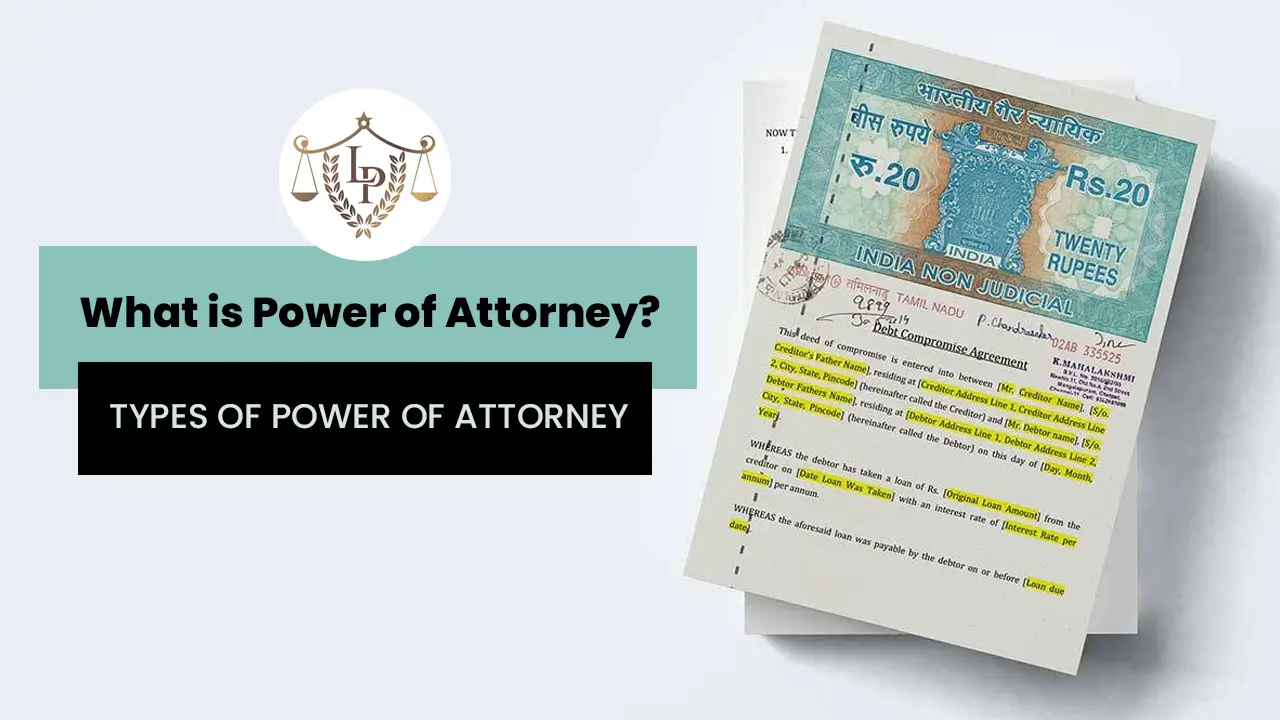Power of Attorney
 Law Phrase 19-05-2024
Law Phrase 19-05-2024

Table Of Contents:
In our life journey, anything can happen at any time. So, it is necessary to plan legally for the unexpected. To help with this, there is a tool called Power of Attorney (POA), which helps with legal planning. Understanding the crucial points of POA will be a key to empowering yourself and your loved ones. It provides a crucial layer of protection in times of need.
What is a Power of Attorney?
Power of Attorney is a legal document that helps you grant authority to someone to act on your behalf in various matters. This authorization will be broad or specific according to the type of Power of Power of attorney.
What are the types of Power of Attorney in India?
There are different types of power of attorney, depending on their specific purposes:
- General Power of Attorney: General Power of Attorney allows your agent to handle almost any matter on your behalf of you. It includes financial transactions, signing documents, managing real estate and conducting business operations. However, it will only become valid till the Principal is incapacitated. So, there are better choices for long-term planning.
- Durable Power of Attorney: This is similar to a General Power of Attorney, but it becomes valid even if the Principal becomes incapacitated. This difference distinguishes it from a General Power of Attorney.
- Special Power of Attorney: It is also known as Limited Power of Attorney, which allows agents to perform specific tasks only.
- Springing Power of Attorney: Springing Power of Attorney will only get active when a specific event occurs, like if the Principal is unable to manage their affairs themselves, like incapacitation.
- Medical Power of Attorney: Medical Power of Attorney, also known as health care proxy, allows the agent to make decisions related to medical matters.
- Financial Power of Attorney: Financial power of attorney focuses especially on financial matters. It will empower agents to handle banking transactions, bill payments, investments and other financial matters.
Benefits of Having a Power of Attorney
- Control and Clarity: It provides clear instructions, such as who will manage their affairs and what legal powers a particular agent has.
- Avoid Court Interventions: Deciding your financial and medical affairs requires court intervention, which is very time-consuming and costly. With the help of POA, you can eliminate this.
- Flexibility: Power of Attorney is very flexible. You can choose any power of attorney from its types based on requirements and situations.
- Peace of Mind: Knowing that someone trusted is handling your personal affairs if you're unable to do so. It will give you peace of mind.
How do you get Power of Attorney in India?
Obtaining a Power of Attorney is a crucial legal process that contains a number of steps that need to be followed for a successful registration of a Power of Attorney:
- Understand your Requirements: First, you need to be clear about your requirements, and on the basis of that, you can choose what type of power of attorney you need to apply for.
- Choose an Authorized Person: Now, choose a specific person to whom you want to give full authority so that they can decide on a particular matter on behalf of you.
- Draft a Power of Attorney Deed: Hire a professional lawyer who can quickly draft a Power of Attorney, which includes necessary clauses.
- Visit a Notary Public: Sign that particular drafted document in the presence of a Public Notary, who will become the witness of the execution of that Power of Attorney.
- Registration of Power of Attorney: In some states, the Power of Attorney is required to be registered from the Sub-Registrar office along with the required documents.
- Get Certified Copies: Get the registered Power of Attorney and keep it in a safe place. Make multiple copies for future reference. Also, share these copies with relevant parties so that they know about this.
How to Cancel a Power of Attorney?
If you want to cancel a Power of Attorney, you need to follow a systematic process that involves legal documentation and official procedures:
- Draft a Revocation Deed: Prepare a formal revocation deed that includes your and the agent's name, address, reference of original POA, declaration, and effective date of revocation.
- Notarize Revocation Deed: Get the Revocation deed notarized by the public notary who will become the witness of the authenticity of that deed.
- Register the Revocation Deed: After notarizing it, you need to register it from the Sub-Registrar's office and pay the registration fees.
- Notify the Agent and Relevant Parties: After revocation, you should inform all the relevant parties about the same. Also, please provide copies of that revocation deed for them to keep in their records.
Conclusion
A Power of Attorney is more than just a legal document. It plays a crucial role in your future planning. By registering a POA, you ensure that your financial, legal and medical decisions will be managed according to your wishes, even if you're unable to do so. Understanding and utilizing a power of attorney will provide security and peace of mind to you and your loved ones.

